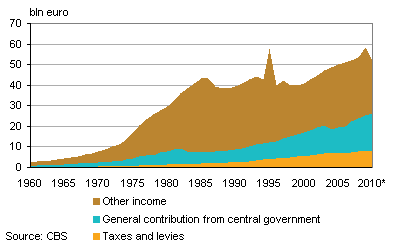Tax revenues increasingly important for municipalities

Municipal taxes and levies have become an important source of income for Dutch municipalities in the last fifty years. Revenues from taxes and levies increased from 98 million euro in 1960 to 7.9 billion euro in 2010. This is the equivalent of a per capita increase from nearly 9 euro in 1960 to 474 euro in 2010.
Municipal revenues

Taxes and levies account for 18 percent of municipal income. Other sources of income are the general contribution from central government, allocated payments, interest revenues, and income from rent, lease and land sales.
Dog licence is oldest tax
The dog licence fee is the oldest municipal tax in the Netherlands. It was imposed as early as 1900, and resulted in an income of around 100 thousand guilders (45 thousand euro). In 2010 total dog licence fees accounted for 59 million euro. In the 1960s, road tax, entertainment tax and licences for the sale of alcohol were the main municipal taxes.
Property tax main source of income in 2010
Revenues from municipal taxes rose considerably following the introduction of property tax in the mid-1970s. Accounting for a total 3.0 billion euro in 2010, property tax is now the main source of income for municipalities. Parking fees also put a substantial amount in municipal coffers: 552 million euro in 2010. In 1985 these fees only yielded 34 million euro. Income from parking fees rose mainly as a result of increased tariffs and the expansion of locations with paid parking.
Costs of waste disposal
Revenues from municipal taxes also rose strongly because municipalities used more revenues from charges for waste disposal and sewage to pay for these services, thus withdrawing less from general resources. Partly as a result of this, revenues from charges rose from 569 million euro in 1985 to 3.9 billion euro in 2010. This is 50 percent of total revenues from municipal taxes.
Revenues from sewage charges have risen by just over 1.1 billion euro since 1985. In 2006 the component of property tax paid by private households who used a property but did not own it was abolished. The decrease in income this caused was partly compensated for by an increase in sewage charges.
Revenues from municipal taxes

Wim den Dulk